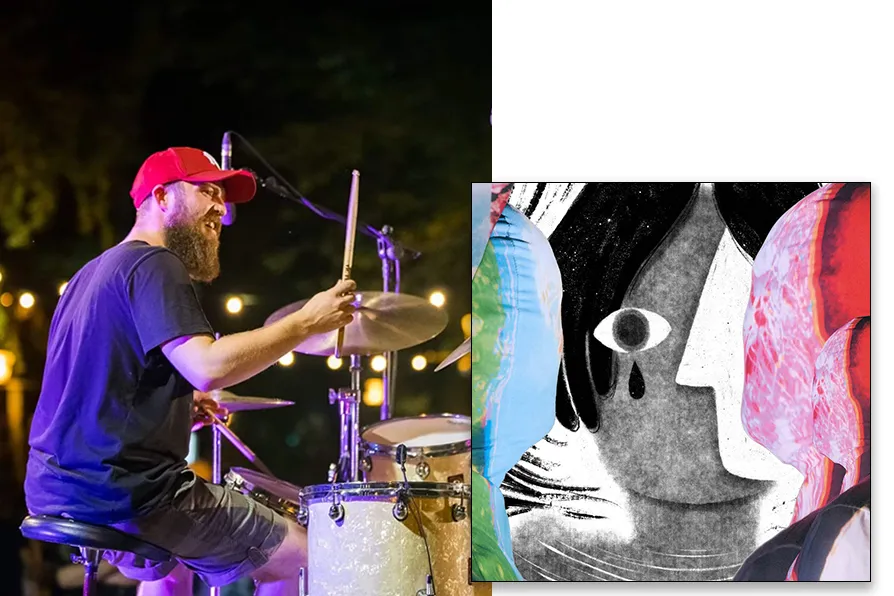DENNIS BROE searches the literary canon to explore why a duplicitous, lying, cheating, conning US businessman is accepted as Scammer-in-Chief
CHRIS SEARLE speaks to drummer WILL GLASER

 Will Glaser [Pic: Courtesy of Will Glaser]
Will Glaser [Pic: Courtesy of Will Glaser]
WHEN you first listen to drummer Will Glaser’s Music of the Terrazoku, two tapes of “ethnographic recordings from an imagined future,” you may ask of these genre-defiant sounds: “How far out can you go?” But then you begin to think, almost immediately: “How far in can you go? How far inside the world we live in is this, and its future in the present?”
The Terrazoku are a many-cultured, multi-ethnic, planet-loving community of survivors of environmental catastrophe. It is their fictional narrative, devised by Glaser, which holds this extraordinary sonic experience together, and Glaser has assembled a rendezvous of powerful musicians to express it with consciousness and brilliance.
Glaser was born in 1991 in Worksop, where his father managed a Halford’s cycle shop before qualifying as a building control surveyor, and his clarinet-playing mother combined piano teaching with working nights in Tesco. “I wanted to play clarinet like her,” says Glaser, “but the teacher told me my teeth were too crooked to play, so Mum directed me towards the drums” — after he had been fascinated by a West African djembe drum his parents had bought at a car boot sale.
He played in the Nottinghamshire Youth Orchestra, was gripped by rock bands like Led Zeppelin and Pink Floyd and eventually became drawn into jazz by his grandad’s love of the music, and began to buy a succession of jazz albums marked by four stars in the Penguin Guide to Jazz Records: by Max Roach, Wayne Shorter, Sonny Rollins, Herbie Hancock and — “decisively” — Ornette Coleman’s At the Golden Circle.
When he left school, he studied at the Guildhall School of Music, where he met and was deeply affected by drum tutors Trevor Tomkins and Paul Clarvis. He swiftly became one of Britain’s most creative improvisational drummers. When I interviewed him he had just finished a tour through Poland with the great protean violinist, Nigel Kennedy.
From his early years his love of music fused with his love of nature. As a boy, his father would take him to the Pennines, which drew out his wonderment: “I really loved nature,” he says. “Even now, if I’m having a bad time, I sit by trees. I find them inspirational.”
Perhaps these experiences prompted Terrazoku, for it is musical storytelling at its most intense. As soon as you hear Ruth Goller’s quasi-subterranean bass on Sunshower or James Allsopp’s haunting bass clarinet and the incessant electronic wind of the planet’s desperation through Howl, with Glaser’s drums as the first, ever-continuous and last sounds of the spoliation of nature and Earth, you witness in music its agony and collapse.
Glaser creates a deft trio which is part electronic, part nature and part human on the track called Bees, comprising electric drums, a field recording of bees in a hive and Goller’s acoustic bass. Then he makes electric birdsong on When the Clouds Pass, and on Theft the slight and vulnerable sound of Alex Bonney’s recorder matched with the pummelling artistry of two drummers — Glaser and Jem Doulton — creates a gripping timbral drama before the screaming imprecations of Ed Dudley warns of the reality of a thousand now-times waterways in There’s Shit in the Rivers.
Yet the hope and struggle of the Terrazoku strive to return the world from disaster to new life, their determination finding the words of Chinese poet Yang Licai, sung with crucial meaning by Lauren Kinsella beside the sawing cello of Estonian Kirke Gross: “Rain is another name for heaven and earth,/ All in the end is water.” Glaser creates rainsound by a field recording of water slashing against a metal staircase. Everywhere is sound, brought into art: “I was allowing sounds to shape themselves into something,” he says.
“It’s about loving nature and a lamentation about what is being lost by a relentless urge for profit, but it’s also a celebration of what must be reclaimed and rebuilt. We have to say something in our music. I get frustrated with the merely theoretical aspect of music and just seeing performers embroiled in their own individualism.
“There is genocide in Gaza and millions more will die if we don’t do something about it. Like Max Roach in his album of Civil Rights, We Insist!, we have to say all this in our times too. The only way I can make sense of the world is through my music: to process my feelings of planetary grief but also to imagine, compose and play for a better future for all of us — or any future at all. For me, as a musician, there’s no other option.”
Music Of The Terrazoku is released by Not Applicable Recordings
Album launch will be held at King Alfred Phoenix Theatre, Golders Green, London NW11 on October 25









